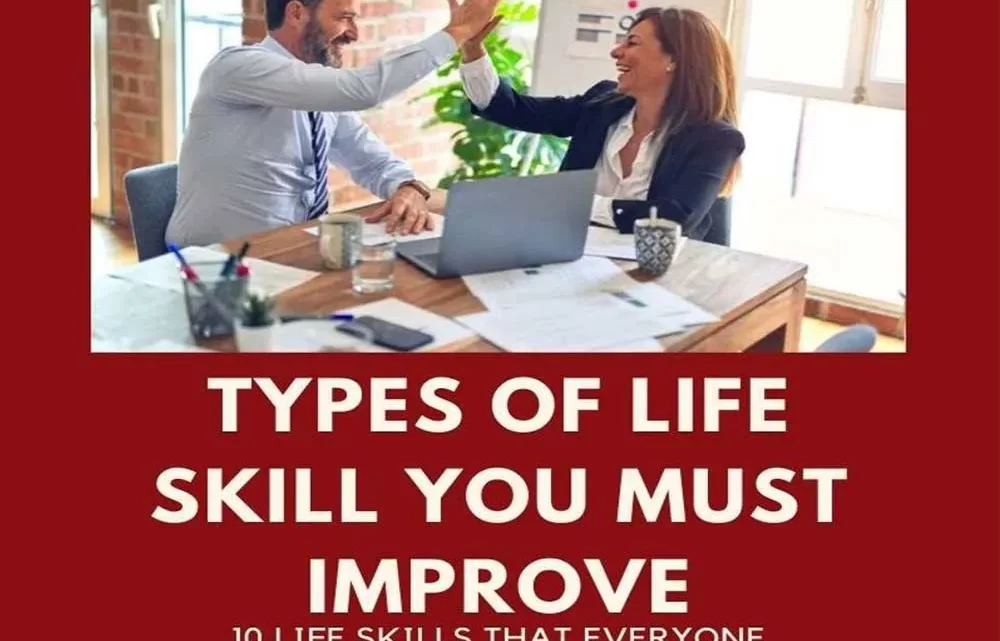
10 life skills that everyone must learn and improve
March 12, 2022What is life skill? A life skill is a term for an attribute that someone can develop in themselves or through practice to improve the quality of their life. It can be anything from cooking, driving, or learning a language. Life skills are different from knowledge and skills which are used to solve specific problems.
This article will give you some useful information on how you can start working towards developing new life skills and create positive change in your own life as well as the lives of others around you.
What are types of life skill?
There are many types of life skills in the world. Below is a short list of some few:
Communication
Communication is the act of engaging or interacting with others through spoken language, or signs and signals (body language). This can be used in different ways such as for contacting support, friends, family or for having a peaceful conversation with strangers. This is one of the most important life skills to learn and practice. As we age communication gets harder to do so we need to learn this skill more and more. Communication can be done on lots of levels also; from easy things like chatting on social media websites to something harder like speaking in front of an audience in professional settings such as at work or during class.
Personal care
Personal care is the act of taking good care of one’s body and health. It is important to learn how to take good care of yourself because as you age it does not get easier. Some ways we can take better care of ourselves are listening to our bodies, resting when we need to, maintaining a healthy diet and exercise regularly. As the population gets older on average it gets harder to stay healthy so it is important life skill to learn.
Financially Literate
Financially literate is a skill that helps us make smart decisions with money. It shows us how to manage money and understand how other factors will affect our daily lives. It allows us to not just survive but also thrive. This means we can meet our financial goals, save money, save for retirement and emergencies, invest money in assets that will build wealth and live our lives to the fullest.
Family Relationships
Family relationships is one of the most important life skills to learn. With the increase of single parent households and parents having less time to spend with their children family relationships are often falling apart. The best way to stay close with your family is to practice emotional intelligence by being respectful and honest with one another while having good communications with your children and keep them involved in family decisions. A strong relationship is important because as you live longer it becomes more difficult to have a close relationship with everyone in your life.
Emotional Intelligence
Emotional intelligence is defined as the ability of someone to control and manage their emotions. It includes managing stress, managing self-confidence and providing effective communication, problem solving and empathy. Emotional intelligence is a skill that can be learned and practiced by anyone. It is important to learn this skill because it will help you build relationships with your family members and friends on all levels: from good to difficult. Emotional intelligence also plays a huge role in your work life, for example being able to handle stressful situations effectively will help you deal with competition or problems at work better than someone who does not have an understanding of their own emotions.
Fitness
A healthy lifestyle can be learned as well as physical fitness. It requires not only regular exercise but also healthy eating and a balanced lifestyle. This can be done in a variety of ways. First, stay active by joining a gym and going to different classes. Also, go on walks with your family or friends; it is more fun with a friend but still equally as good without them. Getting fit can even help you get in better shape such as getting rid of fat and getting an attractive figure instead.
Stress Management
Stress management is a very important skill that everyone should learn because stress affects everyone and can be debilitating over time if left untreated. Stress is caused by many different things such as work, problems at home, and other daily stressors. For example, if we are constantly travelling for our job then we may feel stressed because we are always on the go. The best way to deal with stress is to practice good self-care. Not only should you take a break from mind-numbing tasks but also talk to your friends or family about your worries so they can listen and be there for you if you need them.
Teamwork
Teamwork is a very important life skill that helps us get in the right mindset to tackle life’s challenges and meet our goals. Through teamwork we are able to focus on accomplishing tasks and reaching our goals because others have our back. Teamwork can also help us build strong relationships with co-workers and our clients. The best way to develop teamwork is to practice it on a daily basis. For example, take the time to meet with your co-workers for lunch and talk about anything except work. That way you will be more comfortable talking to them about work related issues when they arise. learn about benefits of Teamwork.
Time Management
Time management is a life skill that can be learned at any age. It requires planning and prioritizing tasks to fit our busy lives while still living effectively in the present moment. This means setting goals, creating schedules, keeping track of tasks and taking breaks when we need them so we can relax before getting back into things again.
Integrity
Integrity is a fundamental life skill that everyone should practice at all times. An important component of integrity is being honest and ethical. We need to put the needs of others ahead of ourselves when it comes to our own well-being. For example, we need to not lie or deceive others, cheat on taxes or steal from our employers. Honesty and integrity requires a lot of self-reflection so it can be practiced easily in different situations both work related and non-work related, but most importantly on a daily basis. Putting ethics first over one’s own happiness will help us make the right decisions for ourselves and for others.
Conclusion
This means that even though we may be limited in the types of skills we can develop, we can still accomplish a lot if we are committed to the act of learning and applying the skills when the time is appropriate. This is why it is important to have a healthy lifestyle by going to the gym and taking a walk on occasion so we get in good shape, enjoy our lives more and can feel better about ourselves as well.









